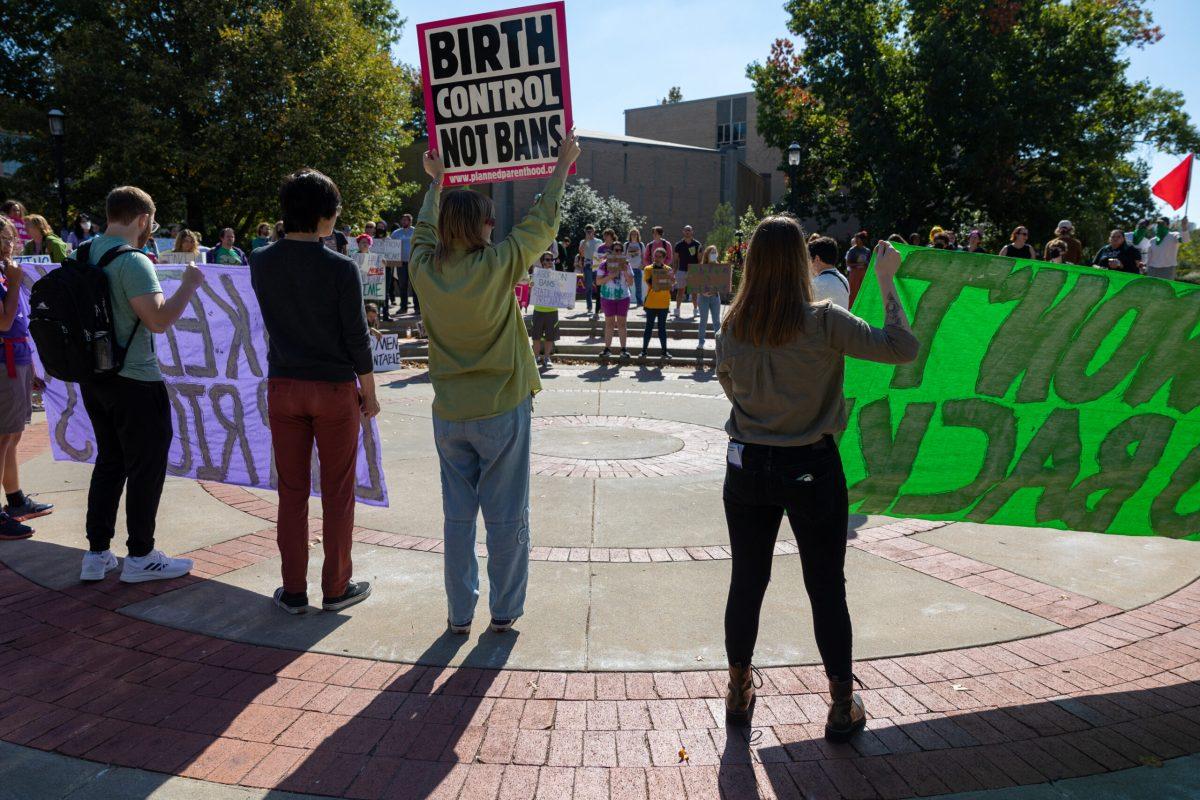
As a broad progressive coalition demonstrated at Speakers Circle for bodily autonomy on Thursday, conversations about the right to an abortion have become even more prominent on MU campus.
The coalition has made three demands of MU: subsidize contraceptives including Plan B, end the censorship of Social Justice Centers and issue a formal statement condemning the reversal of Roe v. Wade.
The U.S. is currently in a time of crisis concerning human rights. With the Supreme Court rolling back decades of progress for marginalized groups impacted by Roe v. Wade — and the suggestion that even more rights could be next — the need for institutions across the country to show support for communities under threat becomes even more urgent.
Access to Plan B on college campuses has become an increasingly popular demand on numerous campuses including Northeastern University in Boston and Barnard College in New York this year. Providing access to contraceptives not only improves the well-being and success of students, but it would additionally show the student body that MU takes the well-being and success of students seriously, increasingly more important after the Dobbs v. Jackson decision in June.
While accepting the first demand would be a step toward progress, it would need to be accepted alongside the second demand. The claim that Social Justice Centers have been censored is an issue that has often been unnoticed. YDSA has claimed that groups such as the Women’s Center have been barred from giving comments concerning the Dobbs v. Jackson decision.
While this claim remains to be verified, any censorship surrounding bodily autonomy is a gross reflection of the university’s position. There should be no tolerance for an approach of this sort. Voices of women and marginalized groups across the U.S. should be supported and unrestricted in these times. Discussion of their rights should not be barred on any grounds, and there is no reason for MU to restrict the Women’s Center’s comments on Dobbs v. Jackson except to give the decision implicit support.
Implicit support has also stemmed from the lack of a statement condemning the reversal of Roe v. Wade. This final demand is the easiest for MU to accept, and to refuse or ignore it would cast a shadow on the communities affected by Dobbs v. Jackson. The coalition is right — this issue is too important for MU to ignore.
MU falls behind several universities across the country in making statements concerning this critical decision. It is concerning to see a decision that impacts so many people go unnoticed. Every voice should be speaking out about this issue, MU administration included. For MU to not make any statement only leads people to conclude that they are guided by either ignorance or open opposition toward the coalition. With over 50% of MU’s population being women, it’s absurd that the university doesn’t deem this decision noteworthy.
Actions speak louder than words. MU’s silence tells us that MU administration is in support of the Dobbs v. Jackson decision — implicitly or otherwise.
Since this is the case, the university should immediately reconsider their stance. Bodily autonomy is a right that cannot be overlooked. The availability of abortions provides control over an individual’s body and life, and this is the bottom line. There should not need to be any further debate than this to realize that allowing states to ban abortion outright is an insane proposal.
The pro-life stance is lacking popularity among Republicans, and their views vary widely on what types of cases should permit abortion. Generally speaking, we’ve seen overwhelming backlash in response to the Dobbs decision in places like Kansas, a traditionally red state which rejected a measure to remove the right to an abortion. If abortion rights can be successfully defended in a state as unlikely as Kansas, it demonstrates that pro-choice advocates better represent the American people.
Between implicit support through ignorance or harboring pro-life feelings, the third possibility could be that MU administration is making an effort to be neutral in the whole affair. However, we are quickly moving beyond a time where an “apolitical” or “centrist” stance can keep institutions or individuals out of conflict. When it comes to access to abortion, there is no middle ground.
As it stands, MU appears to lack consideration for students affected by the reversal of Roe v. Wade. Whether the lack of a statement comes from ignorance, approval of Dobbs v. Jackson or a desire to appear “apolitical,” the lack of a statement remains unacceptable.
At the end of the day, institutions such as MU hold power and influence. Their actions, or lack thereof, carry consequences that ought to be remembered. The U.S. is navigating the sea of division in real time, and the wounds will cut deep with every wrong decision. Now is a time when MU is being tested, and the student body waits with bated breath for their response. Let’s hope there is one.
Edited by Alex Cox | [email protected] Chief: Emily Rutledge | [email protected]